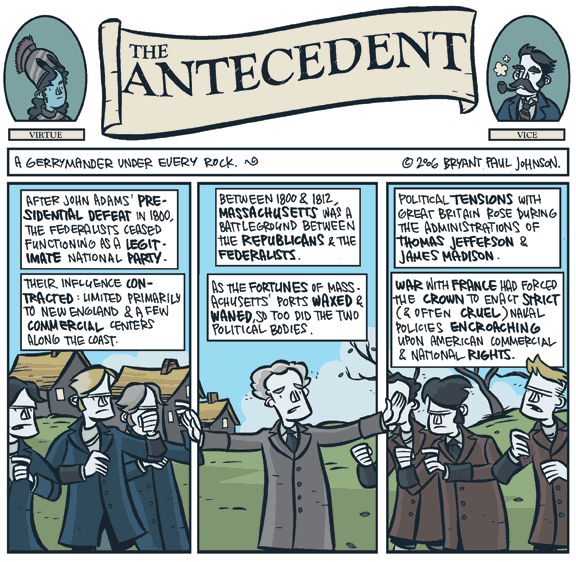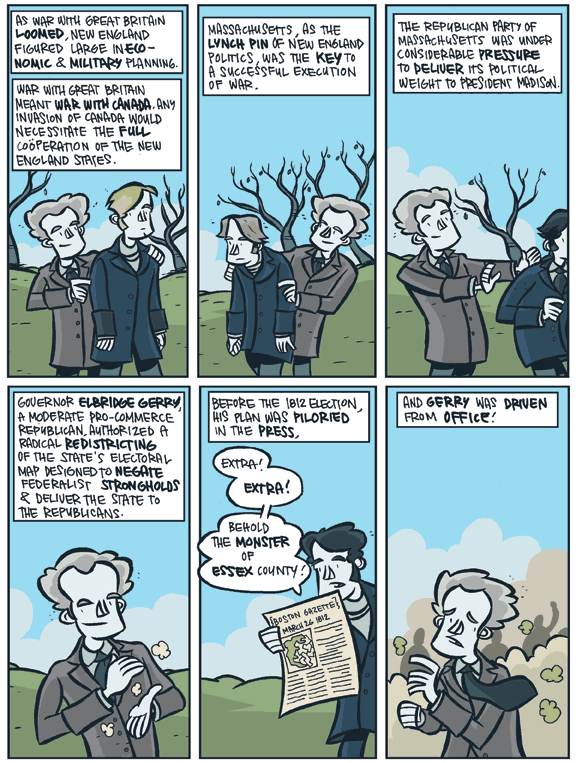

Endnotes
After the American Revolution, the United States and Great Britain remained significant trade partners; insurrection in its former colony hardly dampened British demand for American raw materials, while the former colonists hadn’t the industrial capacity to sever economic ties. In 1794, during the administration of George Washington, Supreme Court Chief Justice John Jay negotiated a treaty with Great Britain that delayed what seemed to be an inevitable future confrontation, giving the new republic time to build its economic and military strength.
When Thomas Jefferson defeated John Adams for the presidency in 1800 (technically, Thomas Jefferson and Aaron Burr defeated John Adams and then Beyond Thunder-domed it out for ultimate supremacy in a months long House of Representatives Battle-Royale [see The Antecedent #3] ) American foreign policy took an about face: Jefferson was an acknowledged francophile with a strong dislike for Great Britain (or rather, a strong dislike for the relationship with Great Britain that the Federalist Party wanted). In response to aggressive British foreign policy, Jefferson set in motion events that would drive the United States into war.
Over the course of many generations, Great Britain and France were constant combatants; they were the 18th and early 19th century’s super-powers. To contain French territorial expansion (particularly following Napoleon’s rise to power), Great Britain’s Royal Navy was massive, powerful and spanned the entire globe. Their primary means of checking French military muscle was the strangulation of foreign trade and naval supremacy.
Under Presidents Washington and Adams, the United States had an official policy of neutrality, ostensibly allowing them to trade with both major European super-powers. Obviously, this angered both sides of the military stalemate in Europe. British ships regularly stopped vessels going to and coming from American ports in the hopes of injuring French economic interests, while the French authorized the use of privateers (pirates) to seize and destroy merchant vessels headed for British ports. With no real navy to speak of, the United States was nearly powerless to stop this abuse of its economic rights.
The merchant fleet of the United States was built upon the backs of a diverse group of sailors many of whom were immigrants (and many of whom were formerly British subjects). In what we might refer to today as a “stop-gap” measure, the Royal Navy was authorized to “impress” men into service, and to forcibly recover deserters. This led to a series of violent confrontations with American ships; sailors who met the naturalization standards of the United States (and were thus considered citizens) were hauled off to British ships and forced to fight for the Crown. This was not particularly popular in the United States who (rightfully) saw it as a violation of national sovereignty. This of course didn’t stop trade with Great Britain. Even with the risk of seizure, the profits of international trade outweighed the risks.
In 1807, Thomas Jefferson created the Embargo Act as an emergency measure to protect the United States from British predation. The Act forbade any and all sea-bound trade with the European powers (including their colonies in the Caribbean). When the commercial ports of the United States abused the provisions of the Embargo Act (mostly those ports in New England, whose proximity to British Canada made evasion simple), all sea trade was banned. Jefferson assumed that patriotic duty would lead the people to self-police the ban. This wasn’t the case (one can criticize Jefferson for holding “the people” in too high regard; he assumed that people would generally act for the good of the many rather than more cynically, and unfortunately accurately, for self interest). Eventually he called on state governments to enforce the Embargo Act. Unfortunate for Jefferson was the fact that the most prominent sea-ports were generally Federalist strongholds certainly unwilling to enforce an act that was killing their livelihood. The Embargo Act was repealed in little over a year, only to be replaced by the slightly more flexible yet still economically damaging Non-Intercourse Act (which prohibited trade only with belligerent partners [i.e. Great Britain and France]).
When James Madison (one of the key architects of the United States Constitution) was elected president in 1808, the Federalists had contracted into a regional party. They no longer were able to field viable national candidates against Jefferson’s Republican Party. Massachusetts, the largest (until 1820, the state of Maine was part of Massachusetts) and most significant economic principle in the North, dominated the politics of New England; the Federalists were forced into the role of minority party, left foil to Republican policies antithetical to commercial interests.
Elbridge Gerry was an early and powerful Massachusetts politician. He served in the Continental Congress and was part of the Constitutional Convention (though he voted against adoption). Though opposed in principle to many of the issues that John Adams held dear, Gerry was a trusted advisor to Adams. During the Quasi-War with France, Elbridge Gerry was one of the American diplomats rebuffed in the XYZ Affair (see The Antecedent #2). Gerry’s long standing Revolutionary era ties to Massachusetts gave him the political clout to overcome Federalist objections to his Republican affiliation.
The Twelfth Congress (who served from November of 1811 to July of 1812) marked a pronounced shift in foreign policy for the Republicans. By James Madison’s election, the party of Thomas Jefferson had fractured into three distinct factions: The moderate northern Republicans of George Clinton and his nephew DeWitt Clinton (who often sided with the northern Federalists in matters commercial); the old traditionalist Republicans of John Randolph (politically aligned to the Republican philosophies of 1798), and the mainstream Republicans still loyal to Thomas Jefferson and James Madison. The Twelfth Congress was comprised of nearly 50% newcomers, many born after the American Revolution. It was a notably belligerent body, whose leaders earned the moniker “The War Hawks.” The War Hawk congress pushed hard for an invasion of Canada which they hoped would entice northern Federalists to support Republican policy (they supposed that the monetary compensation from a radical expansion of territory would outweigh the fiscal penalties of Embargo and Non-Intercourse). It didn’t really work. Federalists in the North found ample fuel in opposition to the Republican majority. The War Hawks would get their way in the end, though without the widespread support of New England.
Before the 1812 election, Elbridge Gerry authorized a re-mapping of the state congressional districts. Redistricting by itself isn’t the political evil that people today assume it is; changes in demographics make it a necessary part of representational government; as populations shift, the electoral composition needs to adjust to changing numbers. What Elbridge Gerry hoped to achieve was a different matter: He hoped to adjust the districts to neutralize the areas which tended strongest towards Federalist policy. By splitting up and weakening Federalist cities and towns, Gerry hoped to create a more lasting Republican presence in Massachusetts.
On March 26th 1812, the Boston Gazette printed a cartoon lampooning Gerry’s redistricting plan. Superimposed over a map of the redistricted region surrounding Boston was a lizard-like creature called pejoratively the “gerry-mander, a new species of monster.” Hence the term gerrymandering.
Elbridge Gerry lost the election for governor to a Federalist candidate dragged out of retirement (Caleb Strong) and control of the state congress followed suit.
Comments are closed.